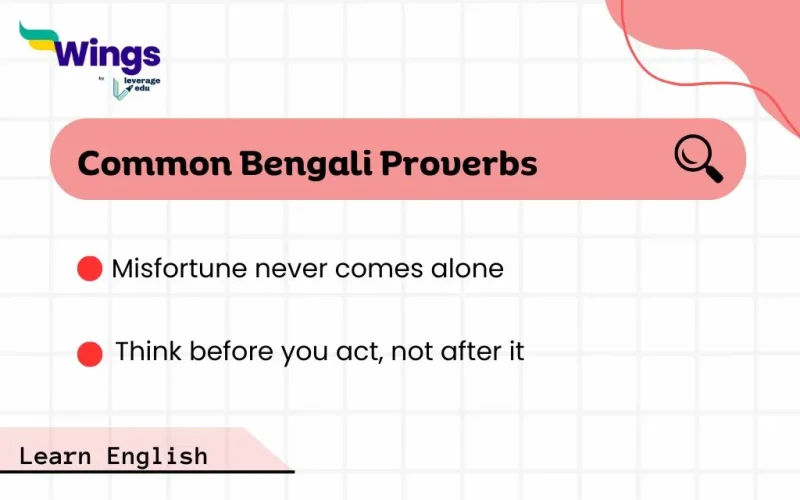In English Grammar, Bengali proverbs, known as “Bengali Bhabar,” are traditional sayings that offer understanding, guidance, or moral lessons. These sayings reflect the Bengali-speaking people’s values, culture, and life experiences. Comprehending these proverbs can give us insights into Bengali culture and help us appreciate the learnings passed down through generations. In this blog, you can find common Bengali proverbs along with their meanings in English.
This Blog Includes:
List of Common Bengali Proverbs with Explanation
From humorous observations to timeless wisdom, Bengali proverbs reflect the values, beliefs, and experiences of the Bengali-speaking community, making them both instructive and delightful to explore.” To learn about these proverbs in depth we have mentioned them below along with their meanings.
“Misfortune Never Comes Alone”
| Meaning: This proverb tells that when something bad happens, it’s often followed by additional troubles or problems. It implies that difficulty tends to occur in a bunch rather than as isolated incidents. Moreover, when you experience one unfortunate event, it is common to encounter more challenges or setbacks soon after that. |
“Barking has Happened, But No Sign of the Trap.”
| Meaning: This proverb generally means a situation where there is a lot of noise or commotion represented by barking, but there is no tangible or visible outcome or result represented by the absence of a trap. It means that much fuss or agitation has occurred, but there is no real consequence or substance to show for it. |
“Throwing Rice Won’t Fool a Crow.”
| Meaning: This proverb suggests that attempting to trick or mislead someone knowledgeable or wise won’t succeed. It suggests that you can not trick someone experienced or insightful they can see through the deception or false actions easily, much like a crow would not be fooled by a simple distraction like throwing rice. |
“One Swallow Doesn’t Make a Summer”
| Meaning: This proverb suggests that a single positive event or instance is not enough to conclude that everything is going well or that a larger trend has been established. Just as one swallow a type of bird emerging does not indicate that summer has arrived, one isolated event or occurrence does not necessarily represent a broader pattern or change. |
“No Clarified Butter Can be Found in a Dog’s Stomach.”
| Meaning: This proverb means that you cannot expect to find something refined or valuable in a place or person where it does not naturally belong. Moreover, clarified butter ghee is a pure and valuable substance but you would not find it in a dog’s stomach because dogs don’t produce or consume such things. |
Also Read: 21+ Proverbs about Apple with their Meaning
5 Common Bengali Proverbs Used Among Bengalis
Proverbs use vivid imagery and local customs to convey universal truths and are widely used in everyday conversations among Bengalis to add depth and understanding to various situations. Listed below are proverbs that people can refer to.

| Proverbs | Meaning |
| Think before you act, not after it. | “Think before you act, not after it” signifies that you should carefully evaluate the effects and potential results of your actions before you do something, instead of dealing with regrets or problems afterwards. |
| The eyes are the mirror of the mind. | “The eyes are the mirror of the mind” means that you can comprehend what a person is thinking or feeling by looking into their eyes. The eyes usually reveal emotions and thoughts that might not be expressed through words. |
| In greed there is sin; in sin there is death. | This proverb suggests that when people are greedy, they can do bad things. Doing bad things can lead to serious effects, including harm or even death. It warns that greed can lead to very negative outcomes. |
| One who goes to Lanka turns into Raavan. | “One who goes to Lanka turns into Raavan” means that people usually adjust to or adopt the negative traits or behaviours of the environment they engage themselves. Lanka refers to the kingdom of the demon king Raavan in the Indian epic Ramayana, who is known for his evil deeds. |
| You must not see things with half an eye. | “You must not see things with half an eye” indicates that you should not judge or observe things hastily or incompletely. Rather, it suggests that you should pay full attention and consider all aspects carefully before deciding or forming an opinion. |
Also Read: 17+ Proverbs Beginning with R and Their Meanings
Common Bengali Proverbs That Carries a Lesson
Proverbs are not just words, they carry deep meanings and life lessons that are relevant to everyone, regardless of age or background. Let’s explore some of these common Bengali proverbs and the valuable lessons they offer.
It Takes Two to Make a Quarrel.
| Meaning: This proverb means that an argument or conflict typically involves the active participation of two people. It implies that conflict usually arises when both parties are involved in some way either by actions, words, or attitudes that contribute to the disagreement. |
If You Don’t Know How to Dance, You Blame the Courtyard for Being Uneven.
| Meaning: This Bengali proverb means that when someone lacks the skill or ability to do something, they tend to blame external factors rather than admit their shortcomings. |
To Lock the Stable When the Mare is Stolen.
| Meaning: “To lock the stable when the mare is stolen” means to take action only after something bad has already happened, rather than taking preventive measures beforehand. It implies reacting to a problem or situation only after it has caused harm or damage, rather than being proactive and preventing the issue from occurring in the first place. |
One Who Has No Head Has No Headache.
| Meaning: It suggests that a person who lacks something usually a responsibility or concern does not have to worry about the problems associated with it. It means that being without certain things can sometimes mean fewer troubles. |
A Bald Man Does Not Fear a Barber.
| Meaning: This proverb indicates that someone who has nothing to lose doesn’t fear threats or dangers that might affect others. For example, if you don’t own anything valuable, you won’t be afraid of thieves. |
More blogs on English Proverbs
| 39+ Easy Proverbs in English to Improve Communication and Writing Skills | 11+ Proverb about Sharing that are Sharable! |
| What-Are-Proverbs-In-English-Grammar | English Proverbs For Class 7 That You Must Know |
We hope this blog has provided all the necessary information on “common Bengali proverbs” that people should know! To advance your grammar knowledge and read more informative blogs, check out our Learn English page and don’t forget to follow Leverage Edu.


 One app for all your study abroad needs
One app for all your study abroad needs












 60,000+ students trusted us with their dreams. Take the first step today!
60,000+ students trusted us with their dreams. Take the first step today!